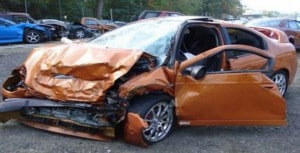
Total Loss
A total loss occurs when a vehicle is damaged to the extent that repairing it would cost more than its actual cash value (ACV) before the accident. In such cases, the insurance company may decide that it is more economical to declare the vehicle a total loss rather than pay for repairs. After a total loss determination, the insurer compensates the policyholder based on the vehicle’s pre-accident market value. At 770GoodLaw, we assist clients in navigating total loss claims, helping them secure fair compensation for their vehicle’s value and guiding them through disputes with insurance companies if they arise.
Understanding Total Loss Determination
When a vehicle is damaged in an accident, the insurance company evaluates the cost of repairs relative to the vehicle’s ACV. If the repair costs exceed a certain percentage of the vehicle’s value, the insurer may declare it a total loss. Each state has specific guidelines regarding the threshold for total loss determinations, typically between 70% and 80% of the vehicle’s value.
Key aspects of total loss determination include:
-
Actual Cash Value (ACV): ACV is the fair market value of the vehicle before the accident. Insurers base total loss settlements on the ACV, which factors in the vehicle’s age, mileage, condition, and depreciation.
-
Repair Cost Threshold: The threshold for declaring a vehicle a total loss varies by state. If repair costs meet or exceed this threshold, the vehicle may be declared a total loss.
-
Salvage Value: If a vehicle is deemed a total loss, it may still have salvage value, which is the value of the damaged vehicle’s parts. This amount can be deducted from the settlement if the policyholder chooses to keep the vehicle.
Process of Filing a Total Loss Claim
The total loss claim process begins when the insurer assesses the vehicle and determines whether it is repairable. The process generally involves the following steps:
- Vehicle Inspection and Damage Assessment: The insurance adjuster inspects the vehicle to evaluate the extent of damage and estimate repair costs.
- Determination of ACV: The insurer calculates the vehicle’s ACV based on its pre-accident market value, accounting for factors such as make, model, year, mileage, and condition.
- Total Loss Declaration: If repair costs exceed the threshold, the vehicle is declared a total loss. The policyholder is typically notified and presented with a settlement offer.
- Settlement Negotiation: Policyholders can accept, negotiate, or dispute the settlement amount. Negotiating may be necessary if the ACV is undervalued or if there are disagreements about the vehicle’s condition.
- Settlement Payment: Once an agreement is reached, the insurance company issues payment to the policyholder or directly to any lienholder if the vehicle is financed.
Common Issues in Total Loss Claims
Total loss claims can present challenges, particularly when there are disputes over the vehicle’s valuation or coverage limitations. Common issues include:
-
Disagreement Over ACV: Insurers may undervalue the vehicle’s ACV, resulting in a lower payout. Policyholders have the right to challenge this valuation by providing evidence of the vehicle’s actual worth.
-
Deductibles and Salvage Value: Policyholders may be responsible for deductibles, and if they choose to retain the vehicle, the insurer may deduct the salvage value from the settlement.
-
Coverage Limitations: If the policy’s total loss coverage is limited, the payout may be insufficient to fully cover the cost of a replacement vehicle.
-
Delay in Settlement: Delays in the total loss determination and settlement process can inconvenience policyholders, particularly if they rely on their vehicle for work or daily needs.
How 770GoodLaw Assists Clients with Total Loss Claims
At 770GoodLaw, we understand the frustration of dealing with total loss claims, especially when insurance companies offer settlements that don’t reflect the vehicle’s true value. Our attorneys work with clients to review their claims, challenge undervalued settlements, and negotiate fair compensation. Our services include:
- Evaluating Vehicle Valuations: We assess the insurer’s ACV calculation, comparing it with market data to ensure it aligns with the vehicle’s actual pre-accident value.
- Negotiating Fair Settlements: If the settlement offer is inadequate, we negotiate with the insurer to increase the payout, advocating for a fair valuation and coverage of all eligible expenses.
- Handling Salvage and Deductible Issues: We assist clients in navigating salvage value deductions and deductible requirements, helping them understand how these factors impact their settlement.
- Providing Support Through Disputes: In cases where disputes arise, we represent our clients’ interests, advocating for a resolution that fully compensates them for their loss.
Importance of Legal Representation in Total Loss Claims
Total loss claims often involve complex evaluations, and insurance companies may not always provide fair or transparent valuations. Skilled legal representation can help policyholders navigate these challenges, ensuring they receive a settlement that accurately reflects their vehicle’s value. At 770GoodLaw, we offer dedicated support throughout the total loss claim process, helping clients achieve a fair resolution and providing peace of mind during a difficult time.
Why Choose 770GoodLaw for Total Loss Claim Assistance
Our commitment to Relentless Reliability and Sincetegrity means that we approach each total loss claim with diligence and integrity. At 770GoodLaw, we work tirelessly to ensure that our clients receive fair treatment, helping them recover the compensation they need to move forward.
